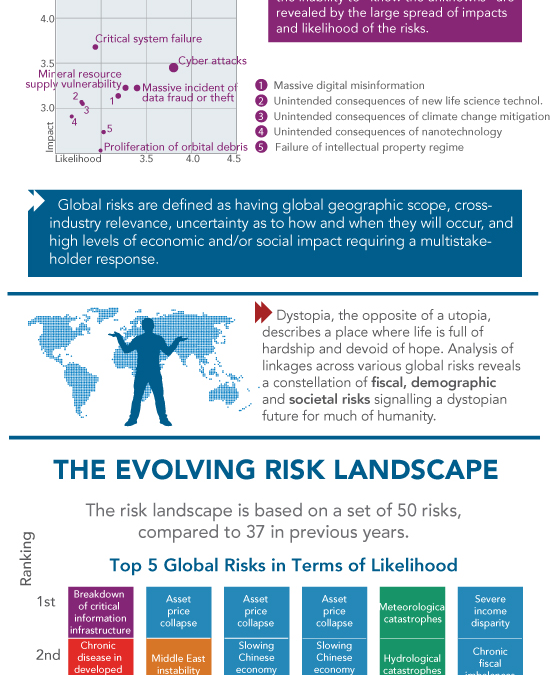


World Economic Forum Global Risks Infographic
The Global Risks report published by the World Economic Forum presents an astonishing risks interconnection map. It clearly reveals how all global risks are interrelated and interwoven, so that economic, environmental, geopolitical, social and technological risks are hugely interdependent. A crisis in one area will quickly lead to a crisis in other areas. The interconnection and complexity in this map compared, to our surprise, at the impact and speed of the recent financial crises illustrates the discord that exists in all systems we’ve built and shows just how disconnected we’ve become. Humanity’s attempts at managing these systems are fragmented and simplistic and not up to the challenges that we face today. Dave Sherman, PhD Business strategist, sustainability expert Source: Global Risks 2012: Seventh...
Can The US Economy Be Fixed?
Newly Re-Elected President Obama Is Expected To Fix The Multiple Problems Ailing The US Economy Jeffrey Sachs, American Economist and Director of the Earth Institute writes in The Economist in his article “Obama has four years to fix the economy:” The modern president must therefore not be the overseer of aggregate demand but the conductor of deep-seated structural changes. He should be the convener of governors, mayors, university presidents, CEOs, healthcare providers and scientists to clear the obstacles from investment programmes in energy, education, infrastructure, health and skills. Mr Obama’s legacy should be to foster the overhaul of the US economy.” It is widely accepted that the newly re-elected President should be presiding over a structural reform of the economy, but most probably not in the way the writer suggests. What Is The Main Problem With The US Economy? As the global crisis exemplifies, despite occasional revivals, the constant quantitative growth economic model is unsustainable, as it is unnatural. This model is built on excessive overproduction and over consumption of mostly unnecessary (by certain statistics over 90% of what is produced is obsolete), and many times harmful products. This model is progressively exhausting both the natural and human resources, causing increasing social inequality and tension, jeopardizing food and water supplies within the very short future. As a result, human beings themselves are becoming increasing sick and depressed, the family unit and the social network is breaking, basically all human built institutions are in crisis. The human society within nations and internationally is strained and threatened with conflicts all over the globe, and humanity in general is at war with...
The Court Jester Cannot Solve The Kingdom’s Problem
Today The Central Bankers Seem To Be The Main Players In Trying To Solve The Global Crisis Raghuram Rajan, Professor of Finance at the University of Chicago Booth School of Business assesses the role of the central banks in solving the global crisis in the article “The Only Game In Town.” He writes: What should central banks do when politicians seem incapable of acting? Thus far, they have been willing to step into the breach, finding new and increasingly unconventional ways to try to influence the direction of troubled economies. But how can we determine when central banks overstep their limits? When does boldness turn to foolhardiness? Central bankers nowadays enjoy the popularity of rock stars, and deservedly so: their response to the difficult and uncertain environment during and after the financial crisis has been largely impeccable. But they must be able to admit when they are out of bullets. After all, the transformation from hero to zero can be swift.” But In Reality Banks Are Powerless In Assisting A True Solution As The Troubled Economies Are Not Only Financial Problems, But Part Of A Larger Human System Failure Unfortunately, the whole situation is upside down. The central banks, or any bank in fact, should not play any role in what is happening. The banks simply got into their prominent positions as a result of the excessive, constant growth economy forcing everybody into overspending, relying more and more on credit. But these financial institutions, with their inflated and imminently bursting bubbles have no real bullets at all, they have absolutely no capacity to solve the crisis. It is the opposite. By...
Europe’s Nobel Wake-Up Call
The European Union Was Awarded The Nobel Peace Prize For The Work It Has Down In The Last 6o Years, While Its Present And Future Is Very Much In Balance Ana Palacio, a former Spanish foreign minister and former Senior Vice President of the World Bank writes in her article “Europe’s Nobel Wake-Up Call:” In a decision criticized and praised in equal measure, the Norwegian Nobel Committee awarded this year’s Peace Prize to the European Union in recognition of its contributions ‘to the advancement of peace and reconciliation, democracy and human rights in Europe’ over the past six decades. But, to what extent is Europe preoccupied with ‘perpetual peace’ at the expense of its current, vastly different ailments? Is this award a swan song – confirmation of the moribund state of the European project, as the 2001 Nobel Prize was for the United Nations?” The Full Potential Of A United Europe Has Not Blossomed Due To Self Interest And Lack Of True Vision People should consider the Nobel Peace Prize awarded to the EU as an award given to the potential of what Europe could become in case of taking on the full measure of the structure that was originally planned. It is not true that Europeans are rejecting the European Union (as the article suggests). It is the politicians and main interest groups that have abandoned, or decided against full union due to individual or group interests. They are stopping the pursuit of a deeper integration that could have fulfilled the original potential. There are multiple examples in life proving that the simple people on the street are only interested...
